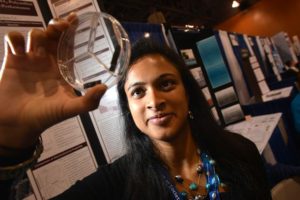 MOBILE phone batteries last for a few hours and then slowly die. We all sigh a little, put them on charge, and wait a few hours more. Well, that’s what most people do at least. But not Eesha Khare.
MOBILE phone batteries last for a few hours and then slowly die. We all sigh a little, put them on charge, and wait a few hours more. Well, that’s what most people do at least. But not Eesha Khare.
When the Indian-born student was a teenager, she didn’t resign herself to the endlessly repetitive cycle of having a phone on and off the charger. Instead, she channelled her frustration into finding a better solution.
The daughter of an engineer, she once found herself away from home and unable to contact her parents due to a dead mobile phone battery. It was the only inspiration she needed to launch her quest to find a better way. She worked night and day on a school project that focussed on developing a ‘super capacitor’ and a way of charging batteries faster than ever before, as well as maintaining a charge for longer than anything on the market today.
Facing an industry awash with huge names like Sony, Samsung, Xioami, Apple and Huawei – together with their billions upon billions of dollars ploughed into advancing their technical capabilities – would be enough to put anyone off even attempting to find an improvement. But not Eesha Khare. Despite an intimidating line up of manufacturers, she burned the midnight oil working with an array of capacitors and micro components until she came up with a tech solution that had the mobile phone industry pricking up its ears.
In 2013, as an 18-year-old student in Saratoga, California, she was handed a $50,000 prize for her industry-changing school project – a super capacitor that will allow mobile phone batteries to be fully charged in about 20 seconds, and maintain power up to ten times longer.
After beating hundreds of competitors to the prize, she decided to put the whole lot into funding her studies at Harvard University where she has been constantly courted by a never-ending line of technical suitors from phone companies desperate to open their doors – and cheque books – to the 21-year-old.
The exciting part is that Khare is now close to finishing her studies, and has declared that she would like to develop her work on mobile phone technology further. At the same time, dozens of industry giants have already publically stated that their technology is now capable of adapting the super-capacitor theory and, therefore, the 20-second charge should be just around the corner.
The question is, which company is this remarkably bright young woman going to choose to be with?































